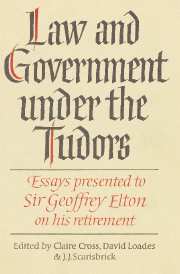Book contents
- Frontmatter
- Contents
- List of contributors
- Preface
- Abbreviations
- Wolsey and the Parliament of 1523
- The Act of Appeals and the English reformation
- Thomas Cromwell and the ‘brethren’
- Henry VIII and the dissolution of the Secular Colleges
- God's law and man's: Stephen Gardiner and the problem of loyalty
- Bondmen under the Tudors
- Wales and England after the Tudor ‘union’: Crown, principality and parliament, 1543–1624
- Robe and sword in the conquest of Ireland
- The principal secretaries in the reign of Edward VI: reflections on their office and archive
- Philip II and the government of England
- Sin and society: the northern high commission and the northern gentry in the reign of Elizabeth I
- The crown, the gentry and London: the enforcement of proclamation, 1596–1640
- Taxation and the political limits of the Tudor state
- Bibliography of the writings of G. R. Elton, 1946–1986
- Index
The Act of Appeals and the English reformation
Published online by Cambridge University Press: 06 July 2010
- Frontmatter
- Contents
- List of contributors
- Preface
- Abbreviations
- Wolsey and the Parliament of 1523
- The Act of Appeals and the English reformation
- Thomas Cromwell and the ‘brethren’
- Henry VIII and the dissolution of the Secular Colleges
- God's law and man's: Stephen Gardiner and the problem of loyalty
- Bondmen under the Tudors
- Wales and England after the Tudor ‘union’: Crown, principality and parliament, 1543–1624
- Robe and sword in the conquest of Ireland
- The principal secretaries in the reign of Edward VI: reflections on their office and archive
- Philip II and the government of England
- Sin and society: the northern high commission and the northern gentry in the reign of Elizabeth I
- The crown, the gentry and London: the enforcement of proclamation, 1596–1640
- Taxation and the political limits of the Tudor state
- Bibliography of the writings of G. R. Elton, 1946–1986
- Index
Summary
At mid-summer in 1530 there were distinct signs that the English government was in a panic. The king wanted the annulment of his marriage to Catherine, but he seemed further than ever from achieving his purpose. A year earlier his attempt to have his case decided quietly, indeed stealthily, in a legatine court at Blackfriars had misfired completely; Catherine appealed to Rome for judgment and in due course Henry was cited to appear there. The case was to open at the Rota in June 1530. The government can have had little confidence that the canon law case it had assembled would carry the day, and so William Benet and Edward Carne in Rome had instructions to use whatever means were necessary to prevent the case proceeding. Meanwhile English agents were harrying canonists and divines in Italy and in the universities to speak out for the king.
These tactics of prevarication and pressure could not delay the hearing for ever nor prevent a judgment being given in Rome, in the fullness of time, and almost certainly against Henry. In the ensuing months the king's men rapidly assembled evidence for the radical propositions that the king, not the pope, was the fountain-head of all ecclesiastical jurisdiction, and that England, not Rome, was the place of final appeal for an English case.
- Type
- Chapter
- Information
- Law and Government under the TudorsEssays Presented to Sir Geoffrey Elton, pp. 19 - 30Publisher: Cambridge University PressPrint publication year: 1988
- 12
- Cited by



